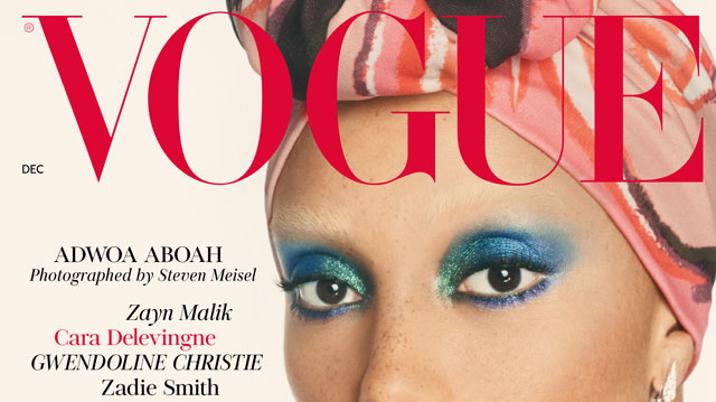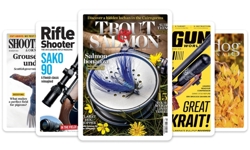
Condé Nast
October saw the shock (to me, anyway) announcement that Glamour magazine was about to undergo what the publishers described as a “reboot”, repositioning the magazine as a digital first offering for the “beauty obsessed”. Its print output was to reduce from twelve to two issues per year. Digitally, the title would feature “how to’s; product reviews; videos; cross pollination with influencers and vloggers; reader reviews and peer opinion”. The editorial and commercial departments will be fully integrated. We were told by new Condé MD Albert Read: “Today’s Glamour consumer moves to a different rhythm than the one who bought the magazine when it launched in 2001.” Maybe, but it’s hard to spin this positively. Perhaps tellingly, the announcement from Condé failed to include a quote from editor Jo Elvin, so I’m guessing it wasn’t her idea. As if to confirm that, Jo subsequently jumped ship a week later. Sportingly, she said: “I’m excited for what lies ahead, for both myself and for Glamour. I wish the new team every success for the exciting new phase of this wonderful, beloved brand.”
Meanwhile, elsewhere at Condé Nast, Stephen Quinn, Vogue’s publishing director for the past 26 years announced that he was retiring at the end of the year. According to Nicholas Coleridge, chairman of Condé Nast Britain, “Stephen has sold more glossy advertising than anyone else alive in Britain today.” He will be replaced by Vanessa Kingori. One of Quinn’s last issues at Vogue was also new editor Edward Enninful’s first. Favourable reviews included this from The Atlantic: “The December issue is a powerful statement from a brand that seems to be asserting not just its own contemporary relevance, but the relevance of an entire nation.” Enninful’s first issue got loads of valuable coverage, including extensively on the BBC, partly, no doubt, as a result of some helpful noises off; a perceived spat between Enninful and his predecessor Alexandra Shulman saw Naomi Campbell wade in on Instagram: “This is the staff photo of @britishvogue under the previous editor #AlexandraSchulman. Looking forward to an inclusive and diverse staff now that @edward_enninful is the editor … let’s hear your thoughts?”
No place like Oldham
Following the sad news at the end of August that the Oldham Evening Chronicle was to cease publication after 160-plus years, the autumn saw a virtual love-bombing of the town. First, Newsquest announced the launch of the new weekly Oldham Times. A few days later, the Manchester Evening News got in on the act, saying it would start regularly publishing an Oldham edition, with several pages of Oldham news and a localised front page. Then, and the good citizens of Oldham have probably not felt this wanted in decades, local radio station Revolution 96.2 announced that it had acquired the Chronicle from administrators KPMG. Phew! The good news is that it was clearly seen as absurd for a town the size of Oldham not to have its own paper. In the ideal world that InPublishing fervently prays for every night, all three of the above will be hugely successful! Watch this space.
Two highly acquisitive companies continued in their highly acquisitive ways. Newsquest bought NWN Media, the publisher of thirteen local news brands across North and Mid Wales, Cheshire and Shropshire. David Faulkner, managing director of NWN Media said, “needs must”. Just kidding. What he actually said was, “Our company has always been proud to be locally owned but I believe that this is an important step into the future at a time when the media landscape demands creativity and innovation more than ever to ensure success.”
Meanwhile, in B2B land, Mark Allen Group just keeps getting bigger and bigger. Its latest acquisition, Community Care from RBI, has special significance for chairman Mark Allen; he was the launch editor back in 1974. Mark describes the years editing the title as “enormously rewarding, absorbing and satisfying.” “Purchasing Community Care completes a magical circle which began for me 43 years ago,” he said.
Also in the acquisitions pipeline, though still to be confirmed, is Trinity Mirror’s bid to acquire 100% of the publishing assets of Northern & Shell (Daily Express, OK! et al). Under new ownership, perhaps the Daily Express, which confusingly still runs ‘THE WORLD’S GREATEST NEWSPAPER’ tagline on its masthead, might again aspire to greatness. In the thirties and forties, that tagline might have made more sense, when under editor Arthur Christiansen, its circulation hit four million. Its September ABC stood at 374,013.
Guardian: busy, busy, busy
In late October, the Guardian announced that it now has 500,000 regular paying “supporters”, vindication as they saw it, of their new strategic focus on growing reader revenues. Furthermore, the clever wheeze of rattling a collecting tin in front of visitors to their website has generated an additional 300,000 individual contributions.
In September, the publisher launched a beta version of Ad Manager – a new self-service ad tool for small and medium sized businesses in the UK. As Commercial Director Nick Hewat explained: “Statistically, SMEs make up around 50% of private sector turnover in the UK yet only represent 18% of ad spend. We’ve developed this ad tool to break down the barriers between smaller companies and the Guardian.”
The Guardian continued to invest in virtual reality, unveiling its latest VR project, The Party – a virtual experience of autism, and giving away nearly 100,000 Google Cardboard headsets to enable people to watch it.
Parent company, Guardian Media Group also announced plans to launch a new, independent £42 million venture capital fund – GMG Ventures. Chief Executive David Pemsel said: “In a rapidly changing media landscape, GMG Ventures will be an essential addition to the experience, skills and qualities of the Guardian, giving us access to the new ideas and innovation that entrepreneurs bring to the table. GMG Ventures will aim to secure investments in some of the very best new businesses emerging out of the media and tech space in the UK, US and continental Europe.”
Happy birthday!
ShortList magazine marked its tenth birthday with a special collectors’ edition. Featuring ten commemorative front covers with ten high-profile cover stars: Anthony Joshua, Niall Horan, Jack Whitehall, Jeremy Corbyn, Craig David, Chris Froome, Jamie Vardy, Rami Malek, KSI (aka Olajide Olatunji) and Jamie Bell. The covers depict each “star” holding a distinctively different photo of them from ten years ago, highlighting, say the publishers, what a difference a decade makes.
Wallpaper*, the only international design magazine with an asterisk in its name, celebrated its 21st birthday, by publishing its heaviest ever issue. At 420 pages, the back-breaking October issue weighed in at 1.48kg, with a spine width of 21mm. That’s big, but presumably the extra advertising revenue more than paid for the increased print and distribution bills. In keeping with the times, the birthday celebrations were supported by a 21-day social media campaign across Facebook, Twitter, Instagram and Pinterest.
Daphne Caruana Galizia
The low point of the autumn was undoubtedly the shocking murder of the Maltese investigative journalist, Daphne Caruana Galizia. In an open letter to the European Commission, eight editors representing leading news organisations (Süddeutsche Zeitung, The New York Times, Financial Times, BBC, La Repubblica, The Guardian, El Pais, Le Monde) wrote that the murder was “an appalling reminder of the dangers that journalists and citizens practising journalism face every day, as they seek to uncover corruption and criminal behaviour by the rich and powerful… Daphne's murderers cannot be allowed to achieve their clear objective of silencing her investigation into corruption at the highest levels in Malta … Daphne's murder, combined with the structural issues the Commission identified, demonstrate the need for a full investigation into the state of media independence in Malta by the Commission…. The murder of Daphne Caruana Galizia demonstrates the danger that journalists face in the pursuit of truth. It also demonstrates the fear that the corrupt and powerful have of being exposed.”
On a more upbeat note, and perhaps not unrelated, the government announced that it was allocating £1 million of funding for press freedom projects around the world. In making the announcement, Foreign Secretary Boris Johnson said: “As a former journalist, I am alarmed that worldwide attacks on journalists are rife and increasing. Civil society is all about free people. Where governments fear freedom of expression they often try to shut down media and civil society, or clip their wings. This both violates human rights and crushes creativity. A free media is vital to creating a vibrant, informed and engaged population and helps to support a safer, more prosperous and progressive world.” Well said, and it’s not every day that I feel I can say that about the foreign secretary.










